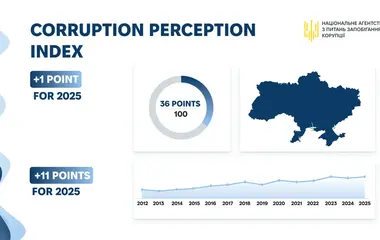The Unified State Register of Persons Who Have Committed Corruption or Corruption-Related Offences (hereinafter referred to as the Register of Violators) is a portal containing information about all individuals and legal entities in Ukraine who have committed corruption or corruption-related offences since 2012. On 15 July, the President of Ukraine signed a law amending the Code of Ukraine on Administrative Offences, the Criminal Code of Ukraine, the Criminal Procedure Code of Ukraine and other legislative acts of Ukraine to increase liability for corruption or corruption-related offences, which will now limit the length of time officials remain in the Register of Violators. The law was published on 16 July and will come into force on 17 July.
What is the Register of Violators
The Register of Violators is a tool of the National Agency on Corruption Prevention (NACP) for verifying information about persons applying for positions with a high risk of corruption. At the same time, the register can help in analysing risks in various areas of public life, in particular when verifying the reliability of counterparties, which is carried out by state bodies, businesses and public organisations. It contains information about individuals who have committed corruption or corruption-related offences, and legal entities against which criminal law measures have been applied by the court for committing corruption offences.
The NACP constantly updates the data in the Register of Violators. The main source of information for this is the Unified State Register of Court Decisions. When a person is brought to criminal or administrative responsibility for committing corruption or corruption-related offences, the State Judicial Administration sends the NACP electronic copies of court decisions that have entered into legal force. For this purpose, an automated data exchange channel between the relevant registers has recently been introduced. In the event of disciplinary action being imposed on a public figure, the obligation to provide information to the Register of Violators rests directly with the body that imposed it.
What violations are included in the Register of Violators
The Register of Violators contains more than 55,000 entries, most of which relate to administrative violations.
Administrative offences that may result in a person's details being entered into the Register include, for example, failure to report a conflict of interest, violation of the rules on receiving gifts, etc. The most common of these is late submission of a declaration. Such offences are usually punishable by a small fine, but even after it is paid, the employee's data ends up in the Register alongside those convicted of serious criminal offences related to corruption: receiving bribes, bribery, embezzlement or misappropriation of property, abuse of office, forgery of documents and seals, etc.
Unlike administrative violations, disciplinary violations do not entail fines, but may result in penalties ranging from a reprimand to dismissal. However, information about a person who has been punished for a disciplinary offence may be entered into the Register even without a court decision — an order from the employer is sufficient.
What are the consequences of entering information about a person in the Register of Violators?
In addition to being branded a ‘corrupt official,’ a person who is entered in the Register may also face reputational damage. For example, although the fact of being listed in the Register does not always block the possibility of employment, the decision to hire remains with the employer: they understand that they may be criticised for hiring a person with a history of corruption.
During competitions for positions or selection to supervisory boards, the presence of information in the Register of Violators may be a decisive argument against a candidate, even if they have excellent professional qualities.
As for legal entities, the Law of Ukraine ‘On Public Procurement’ obliges the customer to refuse participation in the tender if the participant is in the Register of Violators.
There are also legislative restrictions: a person brought to administrative responsibility by a court for an offence related to corruption cannot be appointed to public service for three years. If a person has committed a criminal offence, the court may prohibit them from holding certain positions for a certain period.
Prior to the adoption of the Law ‘On Amendments to the Code of Ukraine on Administrative Offences, the Criminal Code, the Criminal Procedure Code and other legislative acts regarding increased liability for corruption or corruption-related offences’, information from the Register could only be removed on the basis of:
- a court decision to overturn a conviction;
- an acquittal;
- the renewal of the appeal period;
- the annulment of an administrative penalty;
- the annulment of an administrative disciplinary measure;
It also provided for the possibility of excluding from the Register information about persons who were directly involved in activities necessary to ensure the defence of Ukraine, protect the security of the population and the interests of the state, and were/are members of the security and defence forces of Ukraine. In all other cases, these persons remained in the Register of Violators indefinitely.
What are the terms of stay in the Register of Violators established by the new law?
Now, amendments to Article 59 of the Law of Ukraine ‘On Prevention of Corruption’ provide for the following periods of inclusion in the Register of Violators:
- for one year — for information on the civil liability of a natural person for committing corruption or corruption-related offences or the imposition of an administrative penalty on a natural person for committing a corruption or corruption-related offence;
- until the expiry or removal of a criminal record — for information on the criminal liability of a natural person for committing corruption or corruption-related offences;
- for five years — for information about legal entities to which criminal law measures have been applied (Article 96-6 of the Criminal Code of Ukraine) in connection with the commission of a corruption offence.
After the expiry of the specified periods, information about the person in the Unified State Register of Persons Who Have Committed Corruption or Corruption-Related Offences shall be deleted.
It should be noted that this Law also raised the threshold for administrative and criminal liability for false declarations, lowered the thresholds for criminal liability for illegal enrichment, expanded the circle of persons who may be prosecuted, changed the thresholds for civil confiscation of unjustified assets, etc.









